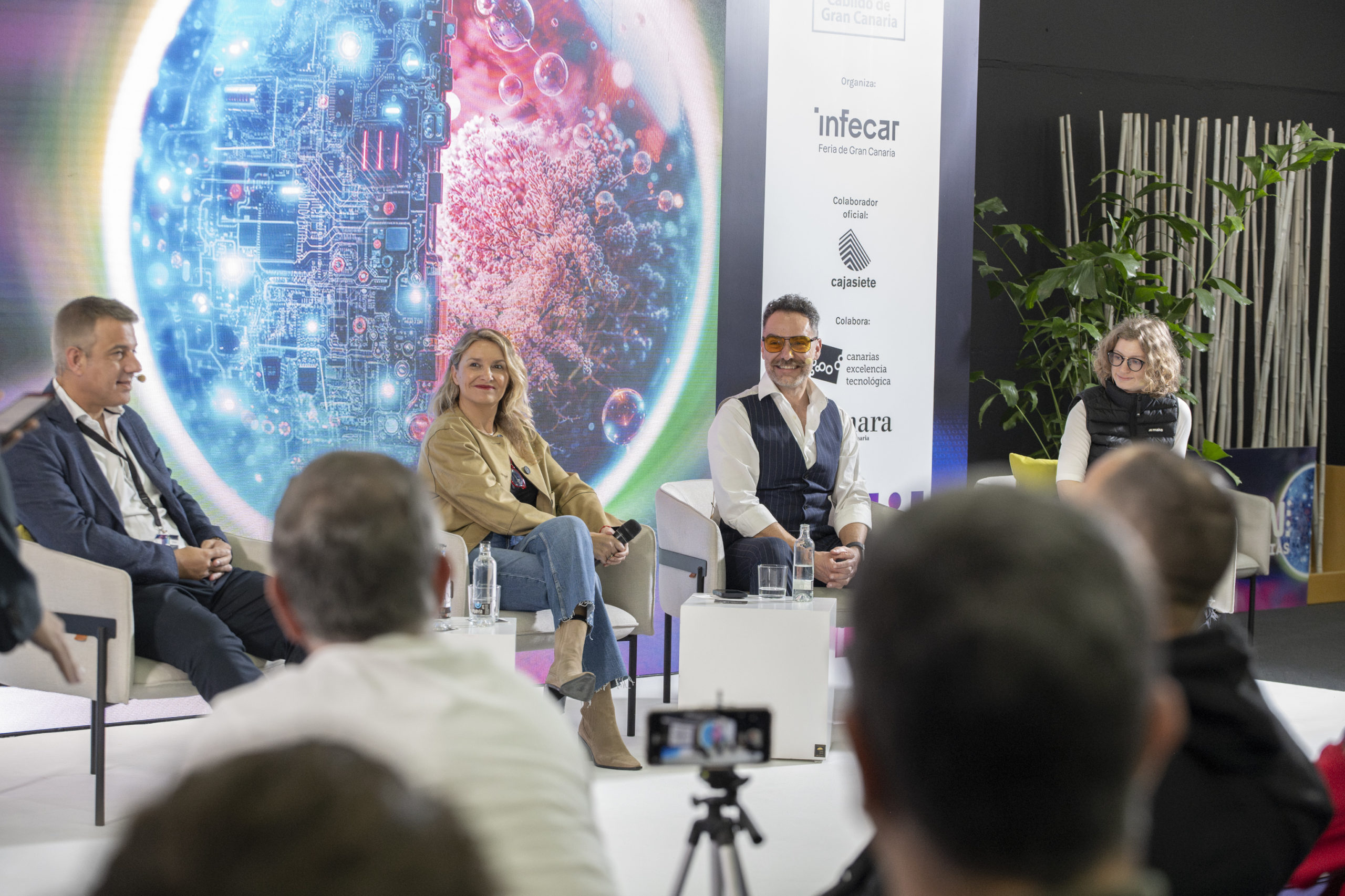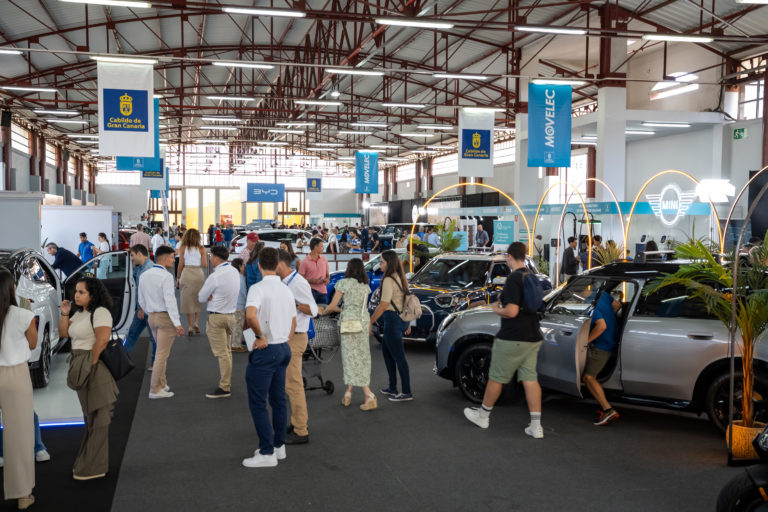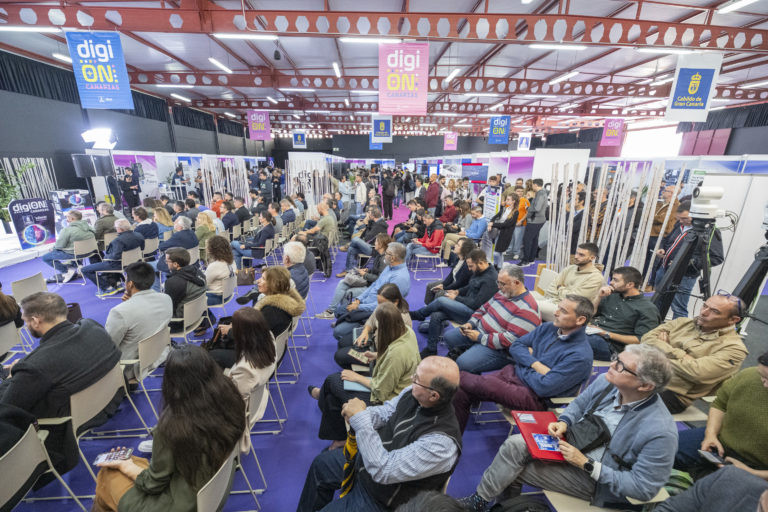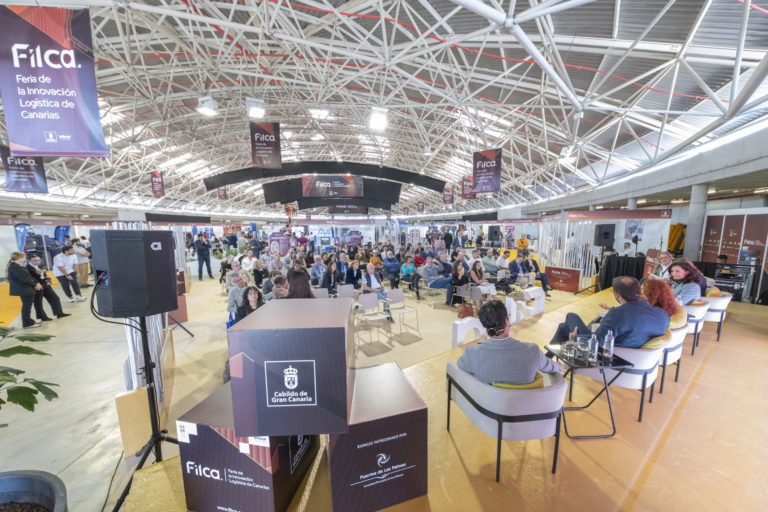- The Business Digitalisation Fair featured talks by local, national and international experts, and the opportunity to hold business meetings
- Many speakers agreed on warning that implementing artificial intelligence (AI) requires a profound digital transformation
DigiON Canarias concluded today after two days of exchanging experiences around digital transformation in businesses, taking another step toward consolidating the island as a technological hub for artificial intelligence.
The satisfaction expressed by attendees and exhibitors during the two days of conferences and meetings validates its status as a benchmark event for business digitalisation.
In today’s talks, Toni de la Pietra, Director of the Advanced Technology Center at Accenture for Spain and Portugal, focused his speech on the opportunities AI offers to the productive sector: “Artificial intelligence is here to help us. The big change is how natural language will interact with generative AI through virtual agents capable of responding like a human.” These agents, he explained, represent an evolution from traditional automation and open new possibilities for sectors such as tourism, logistics, or healthcare: “It is now possible to plan ocean routes, manage tourism reservations, or speed up drug development from years to just months,” he pointed out. He emphasised that collaboration between institutions, universities, and businesses is key to building a solid hub in the Canary Islands.
These topics were also at the centre of the roundtable “Challenges and opportunities of AI in the Canary Islands,” which brought together key figures from the local tech ecosystem such as Miguel Peñate, founder of ReplyNext; Romina Ojeda, CEO of EduKami.AI and Reboot Academy and president of Wise Canarias; and David Macías, CEO of AIOS and author of El método IA.
This session revealed that only 6% of the Canary Islands’ economy is digitalised, compared to 9.5% nationwide. All participants agreed that implementing AI requires a profound digital transformation. “Many companies want to apply AI but are not yet digitalised or lack structured data,” said David Macías, who stressed that “digital transformation is no longer optional, it’s a necessity.”
Romina Ojeda emphasised the urgency of training local talent: “We’re arriving late. There’s a shortage of technical profiles in data and AI, especially outside the main islands.” She also announced that her company will launch a digital literacy project across the islands soon. Moreover, she highlighted the need for an ethical and human-centred approach to AI: “Artificial intelligence must serve people. We can’t forget that humans must validate outcomes and eliminate biases.”
Miguel Peñate pointed out the sustainability challenges of many tech projects in the Canary Islands: “Large initiatives are launched but often fail because they aren’t maintained or updated. Also, many companies lack clear internal indicators to implement AI effectively,” he noted.
Despite the challenges, the potential of the Canary Islands as a unique digital ecosystem was one of the key takeaways from the discussion. “We have a unique identity we must capitalise on — from experience in astrophysics to leadership in desalination. Now is the time to unite as a region and showcase ourselves to the world as an AI hub with its own identity,” Romina Ojeda concluded.
But to achieve that, we need to “reinvent ourselves,” as Toni de la Pietra explained during the roundtable that closed this third edition of DigiON Canarias, focused on the need to digitalise. “We’ve been talking about digitalisation for 20 years; now it’s time to evolve,” noted Patricia Pastor, founder of GP Next Tier Ventures. However, “many barriers are still hard to break through,” she added, referring to some sectors or professional guilds that struggle to adopt new technologies daily.
Sara Maldon, Head of Business Automation at Make, believes the key is to “inspire these companies and help them understand the importance of digitalisation, automation, and AI.” “There’s indeed some resistance to change, but we need a mindset shift. We must work through these fears because the companies that digitalise and use AI will gain a significant advantage,” she explained.
In this regard, Romuald Fons, CEO and founder of BIGSEO, recommended preparing specific plans for each company to ensure employees understand the improvements. In a previous talk, Fons shared real examples of how he has implemented AI to improve SEO, including success stories from his company. In a convenient session, he gave live advice to attendees who shared their concerns and questions.
After an intense second day, DigiON Canarias closes its doors until next year as the leading event on business digitalisation in the Canary Islands.
DigiON Canarias is an initiative of the Cabildo de Gran Canaria, organised by Infecar, with the support of Cajasiete, the Chamber of Commerce of Gran Canaria, and the TIC Canarias Technological Excellence Cluster.



